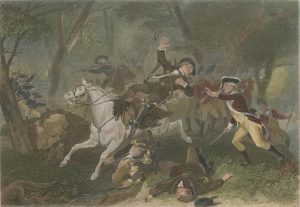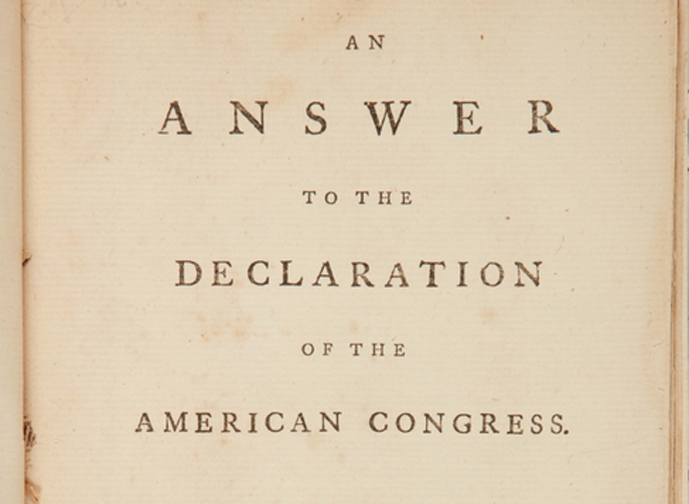
An ardent Patriot from the early days of the American Revolution, Colonel James Williams commanded the Little River Regiment of the South Carolina militia. His letters home indicate a man not only zealous for the cause but also attentive to his business and his religion. After all, “to fear God is the first and great command.”[1] Williams was well read and known to maintain a full library of reading materials. Unfortunately, he could also be rash and given to personal confrontations. While standing for election in the Assembly, Williams broke into a fistfight with the notorious Tory, Robert Cunningham. Even though the fisticuffs went against him, Williams was known for great personal bravery and was repeatedly elected Colonel by the men of his regiment.[2]
When Charlestown fell to the British in May 1780, Cornwallis led an occupation army into the South Carolina backcountry. General Andrew Williamson of the South Carolina Militia found himself forced into an immediate decision to lay down arms or continue the fight. Their situation appeared truly bleak as his Ninety-Six militia brigade stood as the only remaining force in the southern colonies. General Williamson and Col. Andrew Pickens held a vote in which they agreed to follow the majority decision. Fortunately for the Patriots, even though a majority chose to lay down their arms and accept parole, a few partisans under Colonel James Williams remained loyal to the cause and left the district for North Carolina to join an American army.
While the brigade from Ninety-Six District gave parole, Whigs over in the districts between the Broad and Catawba rivers were having an easier time reorganizing. Banastre Tarleton had burned Thomas Sumter’s home prior to the Waxhaw’s Massacre and Sumter already had militia colonels Winn, Hill, Bratton, Lacey and a few others fighting with him. As militia regiments commonly did, they organized their own command structure which included electing Thomas Sumter as their General. The new militia army enjoyed initial success against Capt. Huck’s detachment of dragoons from the British Legion which kicked off a summer campaign in the backcountry against Cornwallis’ outer posts at Rocky Mount and Hanging Rock.
Colonel Williams joined Sumter’s army around the 4rth of July. Since his Little River Regiment had mostly given parole in June, Williams accepted a position as commissary for Sumter’s army. His command consisted of “25 men & horses-to-gether with wagons & teams.” Colonel Williams acted as commissary “until after the battle at the hanging rock when our camp was at a place called Cane Creek.”[3]
At Cane Creek information arrived that Isaac Shelby and Elijah Clark had raised a small army and were operating in the northwestern part of South Carolina. Williams and his men wanted a return to the Ninety-Six District so they could join the backcountry men. This move ran counter to Sumter’s plan and faced heated resistance. As the argument progressed, one of the officers choosing to follow Williams observed simply that, “the troops joined with Sumter or Williams just as their own inclinations led them.”[4]
Colonel William Hill stood on Sumter’s side of the argument and relayed the event from a vastly different perspective. He accused Williams of slipping away in the night. “On a certain morning it was discovered that our commissary & a col Brannon had eloped & had taken a great number of the public horses, a considerable quantity of provisions with the camp equipage & a number of men.” General Sumter was quite upset and “sent Col Lacy with a small guard after them with a view at least to recover the public property.”[5]
When Colonel Lacey caught up with Williams’ group he found “their number too great for him to do any thing by coercive measures” so he asked “the said Williams to walk with him out of the camp. He then presented a pistol to his (Williams) breast & informed him that if he made any noise to call for assistance he was then a dead man.” Colonel Williams then “gave his word of honor that he would take back all the public property & as many of the men as he could persuade to go back.” Lacey’s trick didn’t work and he remained frustrated as Williams then led the wagons and men forward to join with Colonels Clark and Shelby at a place called Cherokee Ford.[6]
August 18, 1780 – Catastrophe at Fishing Creek
With the South Carolina militia forces divided in two, General Sumter moved north with his brigade and captured an important supply train moving from Ninety-Six toward Cornwallis at Camden. When Sumter stopped at Fishing Creek to celebrate his victory, Banastre Tarleton and his Dragoons caught up with him. The result was an embarrassing disaster as Tarleton completely scattered Sumter’s army, capturing a detachment of Continentals in the process. Sumter himself was almost captured in his nightshirt slipping out the back side of his tent. South Carolina’s submission felt complete as news of the twin defeats at Camden and Fishing Creek spread almost simultaneously across the backcountry.
August 20, 1780 – Salvation at Musgrove’s Mill
While Sumter witnessed the scattering of his army, Colonel Williams continued to lead his men alongside Clark and Shelby. The hodgepodge group caught up with a Loyalist regiment under Alexander Innes together with about 300 local Tories near Musgrove’s Mill. According to the official report from Colonel Williams the Patriots “formed across the road, our line Extended at least 300 Yards in length, on a Timbered Ridge, and Twenty Horse was ordered on each flank, waiting the Enemy’s approach. They Advanced within 200 Yards and formed a line of Battle, and moved on within the distance of 150 yards, and then began a very heavy fire.”[7]
The report continued, “Col. Williams gave orders that not a man should fire untill the Enemy came within Point blank Shot, and every man take his tree, and not fire Untill Orders were given, and that every Man take his Object sure, and not to fire till the Enemy was within 80 Yards distance. A warm fire began that lasted about 15 minutes, when our brave friends to their Distressed Country, Obliged the Enemy to retreat, and we drove them about Two Miles.”[8]
After their victory, the colonels heard about the twin losses at Camden and Fishing Creek. They decided to go their separate ways as Elijah Clark wanted to attack Augusta and Isaac Shelby returned to East Tennessee. Colonel Williams and his men took the prisoners and headed for Hillsboro, North Carolina where Governor Rutledge held the remnants of South Carolina’s government in exile. The official report to Rutledge began by acknowledging the joint operation with Shelby and Clark but then, in describing the action, Williams only mentioned himself in command of the field.
At this point Governor Rutledge was in quite a difficult spot. With his state overrun and Sumter’s army scattered, he desperately needed a victory before the civilian population lost all hope. Greatly encouraged by the news from Musgrove’s Mill, Rutledge handed out promotions to Williams and his men. Williams received a brevet commission as Brigadier General of the South Carolina Militia.[9]
Sumter and what was left of his men camped on the East side of the Catawba in the Indian lands while trying to recover from the near devastating loss inflicted upon them by Tarleton at Fishing Creek. As they fumed about their loss, newly commissioned Brig. Gen. Williams rode into the camp and presumed to take command. Not surprisingly, he met stiff opposition as Sumter found support from his colonels and refused to respect the promotion. Indeed, one can only imagine Sumter and the officers from fishing Creek totally outraged and red-faced at this occurring in the shadow of their embarrassing defeat. The arguments against Williams must have been flying. He deserted the army after Hanging Rock and stole much-needed supplies in the process. Militia choose their own officers and Sumter was elected general by those officers. The commission could not be valid until approved by the assembly which had been closed indefinitely. Sumter’s rank predated that of Williams. And, probably the most potent argument of all, Williams’ regiment consisted of less than 40 men while Sumter continued to command 10 times that number.
In short, feelings were so hot that, if General Williams “had not immediately left the camp he would have been stoned out of it.”[10]
Author’s Note: Even though a strong tradition exists that no officer above the rank of colonel participated at King’s Mountain, there are other references to James Williams holding the rank of General. Anthony Allaire, the Loyalist whose diary and later account are considered very important resources, referred to Williams as General Williams three times in his work.[11] Additionally, Joseph Hughes, a pensioner who had witnessed Williams death, referred to him as General Williams.[12] There is no apparent reason to disbelieve these two gentlemen in their support of Hill’s assertion that Williams was promoted to general by Governor Rutledge prior to King’s Mountain.
On the other hand, far more sources refer to him as Colonel Williams. No ready explanation appears to exist for the omission of Williams’ proper title in the official reports other than that perhaps Williams himself withheld the information from Shelby and the others out of embarrassment after the South Carolina militia refused to acknowledge his promotion. It should probably be mentioned that Hill, Hughes, and Allaire were all South Carolina men from the backcountry and in a position to know about the events.
[1] James Williams to Daniel Williams, 12 June 1779, reprinted in William T. Graves, Backcountry Revolutionary (Lugoff, SC, Woodward Corporation dba Southern Campaigns of the American Revolution Press, 2012), 183.
[2] Joseph Johnson, Traditions and Reminiscences, Chiefly of the American Revolution in the South, (Walker & James, Charleston SC, 1851), 482 – 484.
[3] William Hill, Col. William Hill’s Memoirs of the Revolution, (Columbia, SC, Historical Commission of South Carolina, 1921), 16.
[4] Joseph McJunkin, McJunkin’s Narrative, (Draper MSS, Sumter Papers 23VV153-206), reprinted in Graves, Backcountry Revolutionary, 299.
[7] James Williams, Williams Report on the Battle of Musgrove’s Mill, 5 September 1780 (Published by Order of Congress in the Pennsylvania Packet, September 23, 1780), reprinted in Graves, Backcountry Revolutionary, 197.
[11] Anthony Allaire, Diary of Lieut Anthony Allaire, reprinted in Lyman Draper, King’s Mountain and its Heroes, (Cincinnati, Thompson Publishers, 1881), 484.
[12] Joseph Hughes, Pension Application, transcription at – http://revwarapps.org/s31764.pdf, viewed December 2013.










2 Comments
Wayne: Do you know anything about the family (parents, siblings) of James Williams of 96 District? I have an old book with the names Benjamin Adams, Richard (Naton, Maton, Martin?) and M. D Williams with an inscription : “Tryon County, Broad River, July 8 ?, 1778”
And who is The Patriot, Benjamin Martin?
Fourth child of Daniel Williams (1710 – 1759) and Ursula Henderson. Daniel had a will probated in Granville County, NC.
The Patriot, Benjamin Martin. Isn’t he that back country guy who took out Tavington at Guilford Courthouse after leading the counter-attack.